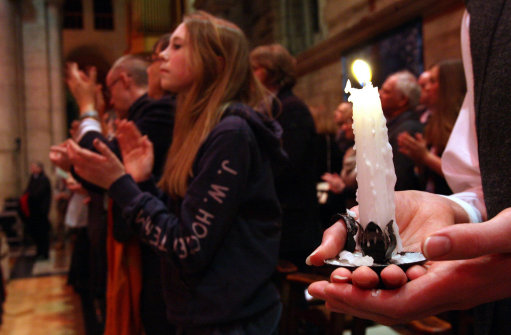Revolution? Bring it on!

And if that's true, which it undoubtedly is, then what better opportunity for Christians to re-discover and embody the truly radical and revolutionary nature of genuine faith?
Speaking at the Church of England's ruling body, the General Synod, the Archbishop referred to the upheaval and turmoil seen in the Middle East in recent years, most immediately in Egypt.
But Justin Welby went on to refer to other sorts of revolutions – the dramatic changes in society that we are living through here in the UK right now. Firstly, he said, there is an economic revolution: "Social need, food banks, credit injustice, gross differentiation of income... and pressure on all forms of state provision and spending: all these are here to stay."
Then, secondly, he said that we are living in a social revolution: "It may be that 59% of the population called themselves Christian at the last census, with 25% saying they had no faith. But the YouGov poll a couple of weeks back was the reverse, almost exactly, for those under 25."
Finally, the Archbishop said we are in a cultural revolution: "We may or may not like it, but we must accept that there is a revolution in the area of sexuality, and we have not fully heard it."
If these things are true, then it seems to me an ideal time to recapture something of the truly revolutionary nature of Christianity. As someone once said, a church can be either a museum (preserving past heritage for the sake of it), or a mausoleum (one step beyond a museum – when it has completely died) – or, alternatively, a living mass movement of people. A museum, a mausoleum or a movement – which would we rather our churches were?
The first century Christians were a truly revolutionary movement. On a day-by-day social level, the impact of the gospel was profound: "All who believed were together and had all things in common; they would sell their possessions and goods and distribute the proceeds to all, as any had need," the second chapter of Acts tells us. There are churches today where this sort of thing is lived out wonderfully right now.
Churches were also revolutionary in their political implications. To declare "Jesus is Lord" was effectively to state that Caesar was not Lord – a truly subversive statement to make. Perhaps today in declaring that Jesus is Lord we have to make it clear that money and possessions are not – however much society effectively says that they are.
Churches were revolutionary in relationship terms as well. Sometimes people wonder why the New Testament did not call explicitly for the abolition of slavery. The short answer is that to do so was as practical as calling today for the overnight abolition of pollution-producing petrol engines. What the New Testament did, however – as the little book of Philemon for example makes clear – was to so overturn relationships between slaves and masters that the whole social order was transformed from within.
George Verwer summed it all up so well in his book "Revolution of Love" when he wrote: "Jesus Christ was a revolutionary – the greatest and most complete revolutionary this world has ever known. Not a political revolutionary, but a spiritual revolutionary. And I believe that Christianity is a 'revolution of love' – a revolution that the Holy Spirit wants to bring about in our hearts and lives as he radically changes the way that we think and act."
So I say: a time of revolutions? Great! Revolution? Bring it on!











